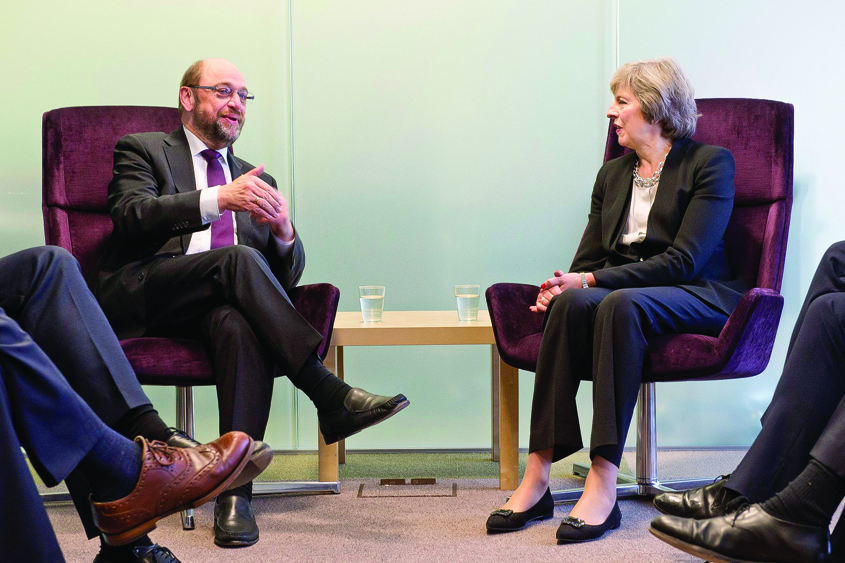Brexit is a dynamic challenge for Theresa May’s government. At the European Council meeting in Brussels, Prime Minister May was cold shouldered on arrival; Eurocrats Jean-Claude Juncker and Michel Barnier played punitive Commission games with May, while Eastern European states were keen to crack on with Brexit negotiations. EU President Martin Schulz was in a strop, fearing that MEPs have been sidelined from the draft Brexit guidelines being discussed at the 27-member states’ dinner. May obligingly reassured Guy Verhofstadt, EU’s Parliament Chief Negotiator, that she would intensify the working relationship between them.
As the Supreme Court assesses if May can proceed with Brexit without the House of Commons’ approval, the Prime Minister tabled an amendment which forced a non-binding Commons vote, but an inherent commitment, to Parliament agreeing that the government must trigger Article 50 by the end of March next year. The motion was carried by a majority of 372. After constant disparagement from backbenchers No10 has finally offered to present MPs with a Brexit proposal in February, allowing MPs just a few weeks’ scrutiny before triggering Article 50.
A plethora of reports have been presented, including House of Lords’ European Union Committee’s lengthy analysis of Brexit: “The Options for Future Trade”, which concluded that the level of engagement and expertise within government are not commensurate with the scale of the unprecedented task of exiting the EU within the given timescale. The Committee found the government to be underestimating the resources required to negotiate a bespoke deal with the EU, to adopt its WTO schedules and to agree to future
There are already a number of Peers and MPs who are prepared to delay Brexit; the Remainer percentage and the bruised ministers who were cast out by May are making their own protests and highlighting division within the Conservative Party, illustrated by the furore caused by MP Nicky Morgan’s remarks about May’s leather trousers featured in a fashion profile in the Sunday Times.
This sentiment was presented by Chancellor Philip Hammond during a questioning by Parliament’s Treasury Select Committee. Hammond said a longer period to manage the adjustment would be helpful to avoid financial instability. This is an unequivocal reflection of Mrs May’s Confederation of British Industry address of three weeks ago. The Minister for Brexit, David Davis is not opposed to a transitional arrangement, although he refers to it as an “implementation phase”. Following the likely concept of a transitional period, the GBP£ strengthened against both the US$ and the Euro. All this makes an actual Brexit seem longer and softer than May originally forecast.
A fresh crowd funded challenge to Brexit has been raised by British QC Jolyon Maugham, contending that Article 50 is actually revocable once activated is to go to Ireland’s High Court. Ireland has been chosen for the legal proceedings as it is UK’s closest EU member state and has a comparable judicial system. This is a not very subtle endeavour to refer the matter to the European Court of Justice and obtain another referendum. This action will appease the Remainer percentage, but will enrage the Leaver majority.
There are already a number of Peers and MPs who are prepared to delay Brexit; the Remainer percentage and the bruised ministers who were cast out by May are making their own protests and highlighting division within the Conservative Party, illustrated by the furore caused by MP Nicky Morgan’s remarks about May’s leather trousers featured in a fashion profile in the Sunday Times. The expensive trouser- indictments were an instrument intended to dent confidence in May’s judgement and her claim that her government works for everyone. Instead, they have brought under scrutiny the reactions of May’s chiefs of staff, who are deemed by a variety of officials to have overstepped their pay grade and behaving as if they were “deputy prime ministers”. Typically, it was Boris Johnson, Foreign Secretary, who had the last tease. At his Christmas party for global ambassadors to celebrate Brexit, he said, “We are so cosmopolitan that we drink more champagne, buy more German cars than anyone else and our wonderful Prime Minister wears lederhosen.”

